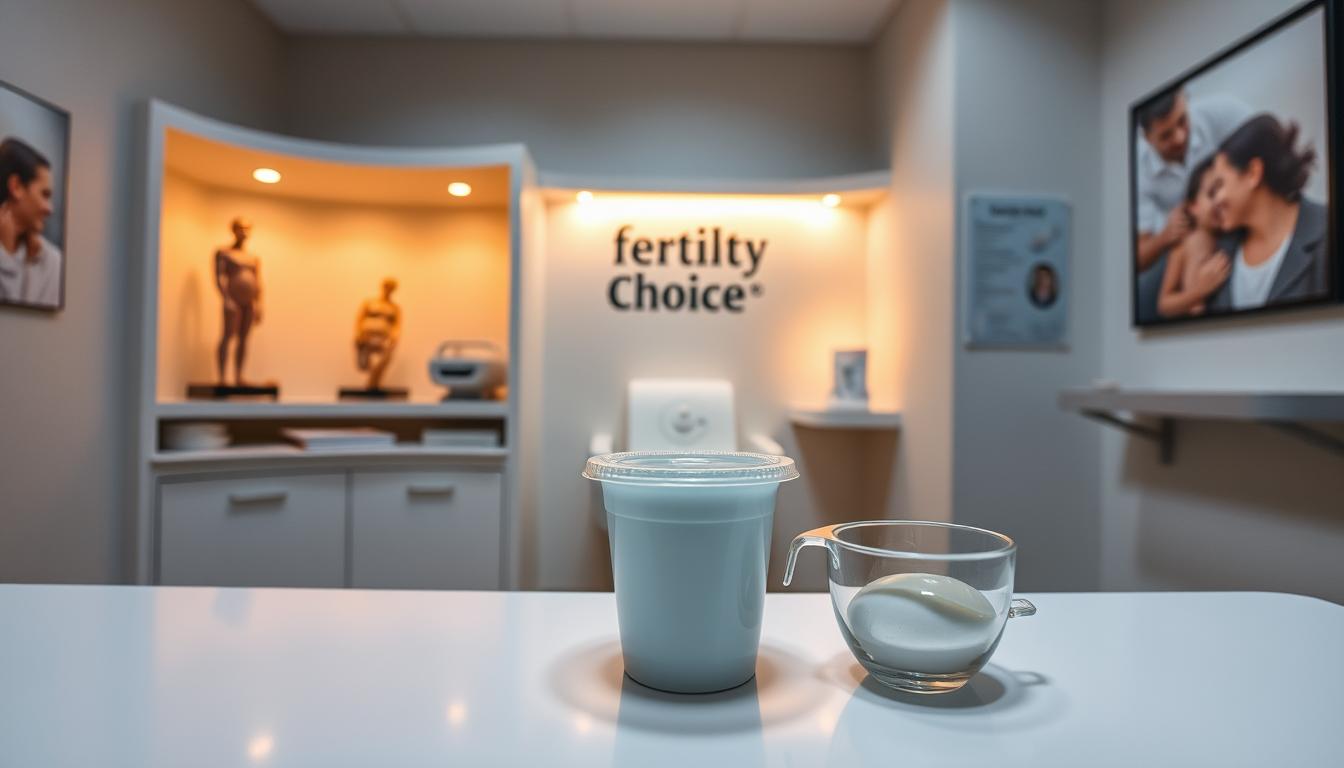
If you’re thinking about donating sperm in South Africa, it can be a fulfilling choice. It helps families who can’t have children naturally. Fertility clinics in South Africa offer a safe space for donors1. The process includes screening, medical checks, and donating sperm. It’s crucial for families in need2.
By donating sperm, you can change lives for families facing infertility. The process in South Africa keeps donors’ privacy and anonymity safe1. Embryologists are key in fertility treatments, ensuring egg and sperm quality and embryo viability1. South Africa’s laws on stem cell research and cloning are seen as weak and outdated2.
Embryologists are key in the sperm donation process in South Africa. They check if the sperm is good enough for fertilization. Sperm banks like Aevitas Sperm Donation Agency have teams of experts, including embryologists, to help with this.
Embryologists are very important in fertility treatments. They check the sperm quality and make sure it’s right for fertilization. In South Africa, they follow strict rules to make sure fertilization works well.
Embryologists need to be very detail-oriented and skilled in the lab. They also need to be good at working under pressure and talking to patients and other doctors3. They must know about the latest in sperm donation, like ICSI and IVF4.
| Service | Description |
|---|---|
| Sperm Donation | The process of donating sperm for fertilization purposes |
| Sperm Banking | The process of storing and preserving donated sperm for future use |
| IVF | A type of fertility treatment where an egg is fertilized with sperm outside the body |
To become an embryologist, you usually need a degree in biology or medicine5. The Aevitas Sperm Donation Agency looks for strong educational backgrounds and certifications. In South Africa, places like BioART Fertility Centre and Cape Fertility provide sperm donation services. They focus on sperm donation laws and sperm donation cost6.
A fertility clinic South Africa like Cape Fertility is SASREG accredited. It has an exclusive egg and sperm donation program with no waiting period for donors7. The clinic offers many fertility services, including assessments and advanced reproductive technologies. To work there, embryologists need the right qualifications and certifications, which can be gained through different educational paths.
Some important skills and qualifications for embryologists include:
The need for embryologists in South Africa is rising. Many fertility clinics and sperm banks are looking for skilled professionals8. This is because more people are using assisted reproductive technology (ART) services. These include donor insemination procedure and checking sperm donor eligibility.
Embryologists can work in different places. This includes private fertility clinics and public healthcare institutions.
Key employers in this field are fertility clinics, sperm bank South Africa, and research institutions. They need embryologists with special skills and knowledge. This includes ART, donor insemination procedure, and sperm donor eligibility9.
To get these jobs, embryologists need a strong education in biology or medicine. They might also need certification or registration with a professional group.

The job market for embryologists in South Africa is set to grow. This is because more people want ART services and technology is improving8. So, embryologists will have many career paths to choose from. They can work in clinics or in research and development in ART and sperm donor eligibility9.
Embryologists in South Africa can grow their careers in many ways. They can specialise in areas like the sperm donation process and sperm donor requirements. Aevitas Sperm Donation Agency helps them keep up with new techniques and technologies10.
In a fertility clinic South Africa, they can focus on reproductive biology and fertility preservation. These areas need a deep understanding of the sperm donation process and sperm donor requirements. They also need to check each embryo for transfer11. Genetic testing, like PGD and PGS, is key for checking for chromosomal issues11.
Some key areas of specialisation include:
It’s vital for embryologists to keep learning. They can do this by going to workshops, conferences, and online courses10. This way, they can improve their skills and move up in their careers at a fertility clinic South Africa. They will help make the sperm donation process and sperm donor requirements more successful11.
Embryologists in South Africa work in fertility clinics or sperm bank South Africa. They handle and analyze sperm samples12. The Aevitas Sperm Donation Agency offers a supportive work environment. It has flexible hours and many benefits.
The donor insemination procedure is key to their job. They need to know about sperm donation South Africa laws13. They work with different donors, ensuring all donations follow strict rules.
| Donor Type | Characteristics |
|---|---|
| Known Donor | Donor is known to the recipient, and may have a relationship with the child13 |
| Anonymous Donor | Donor is not known to the recipient, and has no legal rights or responsibilities12 |
Embryologists must know the risks of sperm donation South Africa and donor insemination procedure12. They screen donors for diseases and genetic issues. They follow strict protocols for handling donations.
Embryologists in South Africa earn good salaries. This shows how vital their work is in fertility treatments. The Aevitas Sperm Donation Agency pays its embryologists well, showing how much they value their skills in checking sperm donor eligibility.
There’s a growing need for skilled embryologists, with a big shortage in Sub-Saharan Africa14. This shortage means more trained embryologists are needed to make IVF services more accessible.
The salary for embryologists in South Africa depends on several things. These include their experience, qualifications, and where they work. Here are some main factors that affect their pay:
Overall, being an embryologist in South Africa is a fulfilling job. It comes with good pay and chances to grow in the field of fertility treatments. This includes sperm donation cost and fertility clinic South Africa services, as well as sperm donor eligibility checks.

Networking and professional associations are key in embryology. They help embryologists share knowledge and best practices. In South Africa, about 1 in 10 couples face infertility, making sperm donation crucial15. The Aevitas Sperm Donation Agency is part of groups like the South African Society for Reproductive Biology and Endocrinology.
Sperm donation laws in South Africa guide the process. Sperm banks like Aevitas follow strict rules for quality and safety. Laws also regulate the donor insemination procedure, ensuring those using donor sperm meet criteria16. On average, a sperm bank limits 10 families per donor to avoid genetic issues15.
Some important facts about sperm donation in South Africa include:
Professional associations, like the South African Society for Reproductive Biology and Endocrinology, are vital. They offer a space for embryologists to network and share knowledge. These groups also help regulate the field, ensuring sperm banks and fertility clinics meet high standards.
| Sperm Bank | Location | Services |
|---|---|---|
| Aevitas Sperm Donation Agency | South Africa | Sperm donation, donor insemination procedure |
Embryologists in South Africa, like those in fertility clinics, deal with tough emotional challenges. They work with patients who are trying to conceive17. The process of sperm donation and the requirements for donors and recipients can be very emotionally demanding18.
Fertility clinics in South Africa, like Aevitas Fertility Clinic, offer support to their embryologists. They help them to provide the best care to their patients.
Embryologists face many obstacles, including keeping up with new technologies and techniques14. They also have to deal with the emotional strain of working with patients who are struggling with infertility14. To tackle these challenges, embryologists can seek support from colleagues and mentors. They can also stay organized, manage their time well, and focus on their own well-being.
| Challenge | Strategy for Overcoming |
|---|---|
| Emotional demands of working with patients | Seeking support from colleagues and mentors |
| Need to stay up-to-date with latest technologies and techniques | Attending conferences and workshops, reading industry publications |
| Managing time effectively | Prioritizing tasks, using time management tools and software |
Starting a career in embryology can be very rewarding. It lets you help people who are struggling to have children. As an embryologist, you’ll be part of the team that helps create new life. This is a chance to make a real difference in the lives of others19.
Being an embryologist is both challenging and fulfilling. You’ll help with sperm donation, banking, and fertility treatments. Your work can bring joy and hope to couples who want to start a family19.
The demand for skilled embryologists in South Africa is growing. By choosing this career, you’ll find personal satisfaction. You’ll also help advance reproductive science and improve treatment outcomes20.
If you’re interested in a career that combines science, empathy, and changing lives, embryology might be for you. Take the first step and discover the rewarding opportunities in this field.
Stay Connected and Get Personalized Assistance
Thank you for reading! We hope you found this post helpful and informative. If you have any questions or need further assistance, please reach out. We’re here to help you on your journey
